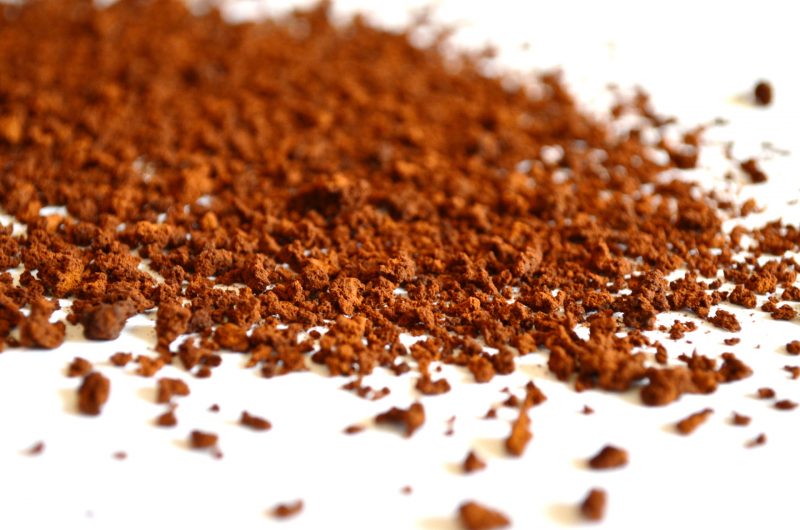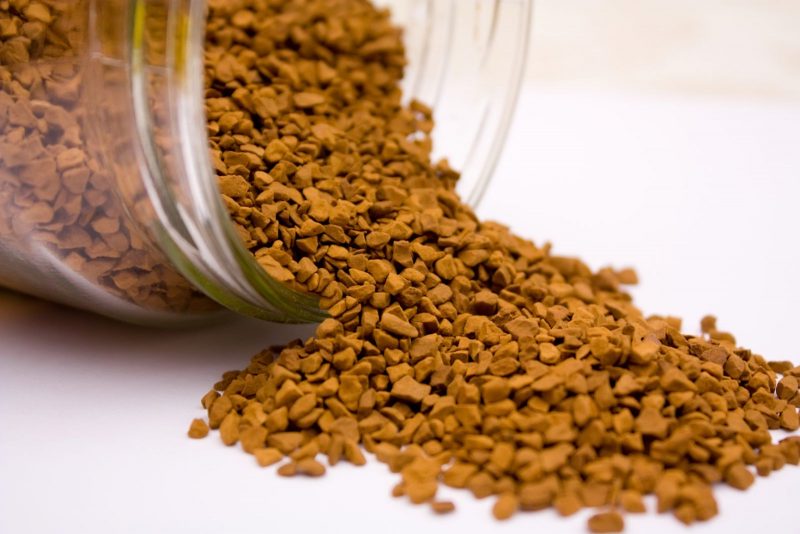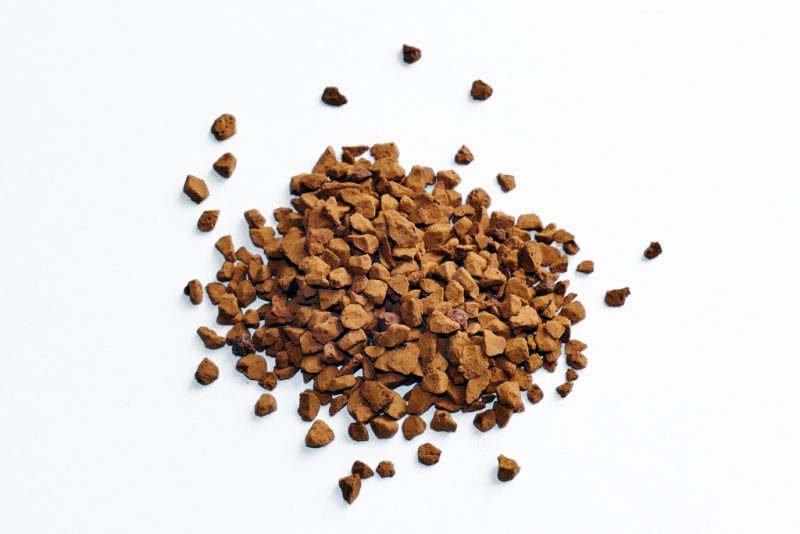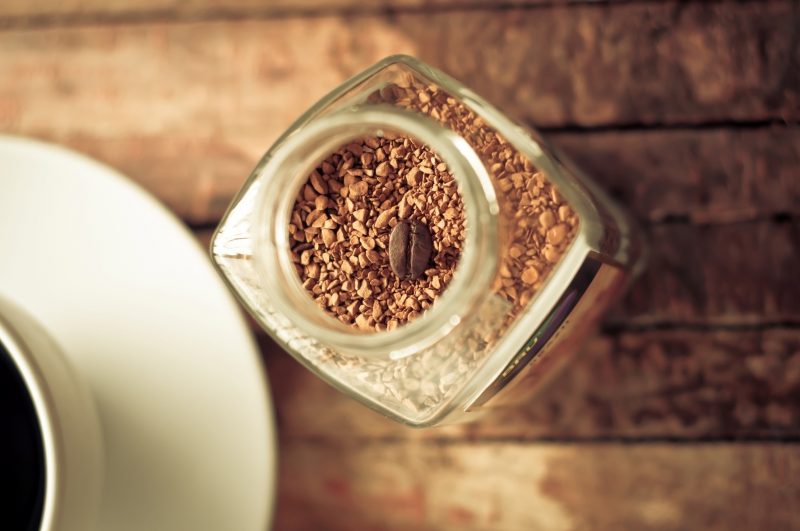The calendar of unusual holidays offers an interesting date in July - the birthday of instant coffee. It turns out that this drink is already more than 80 years old - that’s how much time has passed since the start of production of the famous drink in a new form. Is it really possible to safely replace the long process of brewing coffee with such a faster and more convenient method of preparation? The question of the benefits and dangers of instant coffee excites many lovers to cheer up in the morning with a cup of aromatic drink.
Material Content:
The composition of instant coffee and the technology of its manufacture
To understand what is in the jar, from which we pour the powder into the cup, we need to trace the path that the coffee beans pass before entering this jar.

Manufacturers of the drink, of course, have their own special technologies, secret ingredients and additional methods that attract consumers. But the main stages of production are the same for different firms.
- Sorting coffee beans. It will be ridiculous to assume that beautiful grains are used for a soluble drink. Those that cannot be sold because of their unattractive appearance - broken, shapeless, rumpled - are suitable for production.
- Roasting process. It allows you to achieve a rich dark color of the product and the original taste of coffee.
- Grinding Special machines turn grains into powder, similar to ordinary flour.
- Extraction. Particles pass through boiling water under high pressure. This is a kind of digestion that allows you to turn substances from small particles into liquid (about 40% of the total amount). The process lasts 4 to 5 hours.
- Filtration.The resulting extract is filtered to get rid of heavy resins, various sedimentary impurities.
Further production technology depends on the desired end result, that is, the type of coffee.

There are three types of products:
- powder;
- in the form of granules;
- freeze-dried coffee.
In the first case, the spray drive technology is used, in which drops of the extract are spray dried by a stream of hot air. In this way, a fine powder mass is obtained, which is cooled and poured into cans. But the natural taste and aroma are completely lost. This method is the least expensive for manufacturers, so this coffee is cheap.
The second type is produced using additional aggregation technology. In this case, the initial stages are the same as in the manufacture of powder substance. Then the powder is subjected to high pressure steam to compress it into granules. The quality of such a product is practically no different from the previous type. But the cost is higher due to the additional costs of aggregation.
Sublimation requires more modern equipment, and therefore the cost of this type of product is an order of magnitude higher. “Freeze drive” is the so-called technology in which coffee extract is sprayed with quick freezing, and then small crystals are dried in special chambers.

As a result of each of these production methods, a coffee mixture is obtained that contains from natural ingredients:
- 2 to 3% caffeine,
- about 10% of ash, which is also a product of grains;
- saccharides.
But the remaining components are necessary in order to give the drink a characteristic taste and aroma that is lost during such a number of lengthy heat treatments. These are fragrances, essential oils, colorants and preservatives. Basically, they are of synthetic origin.
There are more natural drinks that do not have chemical additives in their composition. Such coffee is called organic.
Another type of instant product is decaffeinated coffee. It does not do without chemical components.
Health benefits for women, men
If you carefully follow all the stages of the production of the drink, it becomes obvious that the process deprives it of most of the components of natural coffee. After all, those aromatic substances that are contained in grains in their natural state evaporate, and their place is occupied by chemical ingredients “identical to natural”.

Therefore, the beneficial properties of instant coffee can not be said. They are all “lost” on the long path of several processing.
Of course, the drink can also invigorate in the morning, but experts explain this effect as a psychological rather than physiological factor. A person hears the smell of coffee (after all, supplements perfectly fake a natural aroma) - the brain receives a signal about the influx of caffeine into the body and causes it to tone.
The advantage is the speed of preparation of the drink. This moment is especially important for men who do not have enough time to brew coffee. Quick, easy and convenient: poured into a cup - and you're done.
People's advice:hibiscus tea
Rules for the use of instant coffee
To reduce the effect of a "chemical" drink on the body, you need to follow the rules of use.

They are clear and simple:
- Do not drink on an empty stomach due to possible poisoning;
- optimal time of use - 1 hour after eating;
- pour into smaller cups;
- drink coffee with clean water at room temperature (200 ml);
- do not exceed the daily intake of 2 cups of drink.
The best recommendation that nutritionists give is to generally abandon such a product in favor of ground coffee beans.
Can I drink instant coffee during pregnancy and lactation?
The issue of food and drink safety is especially important for women expecting a baby.After all, in this position, you should take care not only about your health.

The use of instant coffee during this period, especially in large doses, can cause:
- pathology in the development of the supporting system of the fetus;
- problems in the mental development of the unborn child;
- miscarriage.
Therefore, you should not expose yourself and the baby to such a risk, because during pregnancy you can safely do without such a drink, replacing it with more natural and healthy ones.
Coffee ingredients are especially harmful to babies who are fed breast milk. After all, the body of crumbs is not able to digest the components of the drink. This can cause severe allergic reactions: itching, swelling, hives.
Breastfeeding is not a contraindication to drinking a drink, but nevertheless, mom should be especially careful and observe the reaction of the baby after drinking a cup of coffee.
Contraindications and possible harm
As it became clear from the information indicated above, there can be no benefit from drinking the drink.

Moreover, in some cases, enjoying the aroma and taste of “chemical” coffee can lead to dangerous health consequences.
Among them:
- drug addiction, causing anxiety and disorders of the nervous system;
- circulatory system disorders;
- leaching of calcium, which causes problems with bones and joints;
- increased acidity, causing gastritis, ulcerative pathologies, poisoning;
- dehydration of the body;
- problems with the reproductive system in men and women, infertility;
- decreased brain activity;
- atherosclerosis, arrhythmia.
Based on their possible side effects, there are groups of people who should not drink instant coffee:
- pregnant women - due to the high probability of a miscarriage;
- couples who want to have a baby - due to a decrease in sperm activity in men and fertility in women;
- “Cores” - due to negative effects on blood vessels and myocardial rhythm;
- patients with diabetes;
- truckers - due to the short-term effect of a small amount of caffeine in such a drink, drowsiness is possible after 30 - 45 minutes;
- people with lactose intolerance (when using instant coffee with milk);
- children - due to the effect on the fragile nervous system, increased excitability and aggressive behavior are possible;
- elderly people - there is a high risk of jumps in blood pressure, problems with falling asleep.
The choice between instant coffee and its natural option is obvious: it is better to buy coffee in beans or already ground to prepare a fragrant and healthy drink. After all, health must be protected and monitor what you eat your body.












